The United States Military Academy
“West Point”
“Duty, Honor, Country”
“A Cadet will not lie, cheat, steal, or tolerate those who do.”
Cadet Andrea Lee Hollen, the first Woman to graduate from the Academy in 1980
The first book I remember going to the library and selecting to read, when I was a child, was a book about General Douglas MacArthur; I am certain I read some other story books before that biography made its way into my life, but this was the first book which became a page turner, in my world!
I admired the adventurous life he led, and of course his success, on the field of honor; but this book was also my first introduction to West Point, planting in me a desire to see this place where he had not only studied, along with a very impressive list of accomplished men and now women, but a place that was also tied to the very history of America, as a nation.
Many years ago, we drove by the United States Military Academy, and for some silly reason, which I no longer remember, were unable to tour the grounds; thus when we once again found ourselves in the general vicinity, we determined not to miss this opportunity to walk around the General’s old stomping grounds.
This four year military academy, the oldest in the nation, established on March 16, 1802, by Thomas Jefferson, is charged with preparing men and women to serve in the United States Army, it is located in West Point, New York, which was first occupied in 1778, by the Continental Army, and the post has remained under control of the Army ever since.
Like its counterparts, in other branches of the military, admission to this highly prestigious campus is not only based on academic excellence and physical fitness, but also requires a recommendation from a member of Congress or of the Executive branch of government.
The campus is open to the public, and you do not need to be a part of a tour to see the campus, in fact I would not recommend it. Rather, arrive early enough to walk the grounds and bask in the history and honor which this fine institute represents.
“The Long Gray Line” refers to current students and alumni
The Great Hudson River S Chain was used in the River to stop the British
From their web site:
A Brief History of West Point
“West Point’s role in our nation’s history dates back to the Revolutionary War, when both sides realized the strategic importance of the commanding plateau on the west bank of the Hudson River. General George Washington considered West Point to be the most important strategic position in America. Washington personally selected Thaddeus Kosciuszko, one of the heroes of Saratoga, to design the fortifications for West Point in 1778, and Washington transferred his headquarters to West Point in 1779. Continental soldiers built forts, batteries and redoubts and extended a 150-ton iron chain across the Hudson to control river traffic. Fortress West Point was never captured by the British, despite Benedict Arnold’s treason. West Point is the oldest continuously occupied military post in America.
Several soldiers and legislators, including Washington, Knox, Hamilton and John Adams, desiring to eliminate America’s wartime reliance on foreign engineers and artillerists, urged the creation of an institution devoted to the arts and sciences of warfare.
President Thomas Jefferson signed legislation establishing the United States Military Academy in 1802. He took this action after ensuring that those attending the Academy would be representative of a democratic society.
Colonel Sylvanus Thayer, the “father of the Military Academy,” served as Superintendent from 18l7-1833. He upgraded academic standards, instilled military discipline and emphasized honorable conduct. Aware of our young nation’s need for engineers, Thayer made civil engineering the foundation of the curriculum. For the first half century, USMA graduates were largely responsible for the construction of the bulk of the nation’s initial railway lines, bridges, harbors and roads.
After gaining experience and national recognition during the Mexican and Indian wars, West Point graduates dominated the highest ranks on both sides during the Civil War. Academy graduates, headed by generals such as Grant, Lee, Sherman and Jackson, set high standards of military leadership for both the North and South.
The development of other technical schools in the post-Civil War period allowed West Point to broaden its curriculum beyond a strict civil engineering focus. Following the creation of Army post-graduate command and staff schools, the Military Academy came to be viewed as the first step in a continuing Army education.
In World War I, Academy graduates again distinguished themselves on the battlefield. After the war, Superintendent Douglas MacArthur sought to diversify the academic curriculum. In recognition of the intense physical demands of modern warfare, MacArthur pushed for major changes in the physical fitness and intramural athletic programs. “Every cadet an athlete” became an important goal. Additionally, the cadet management of the Honor System, long an unofficial tradition, was formalized with the creation of the Cadet Honor Committee.
Eisenhower, MacArthur, Bradley, Arnold, Clark, Patton, Stilwell and Wainwright were among an impressive array of Academy graduates who met the challenge of leadership in the Second World War. The postwar period again saw sweeping revisions to the West Point curriculum resulting from the dramatic developments in science and technology, the increasing need to understand other cultures and the rising level of general education in the Army.
In 1964, President Johnson signed legislation increasing the strength of the Corps of Cadets from 2,529 to 4,417 (more recently reduced to 4,000). To keep up with the growth of the Corps, a major expansion of facilities began shortly thereafter. Another significant development at West Point came when enrollment was opened to women in 1976. Sixty-two women graduated in the class of 1980, to include Andrea Hollen, Rhodes Scholar. Just as women are a vital and integral part of the U.S. Army, so they are at West Point.
In recent decades, the Academy’s curricular structure was markedly changed to permit cadets to major in any one of more than a dozen fields, including a wide range of subjects from the sciences to the humanities”
http://www.usma.edu/SitePages/Home.aspx
General Douglas MacArthur’s Farewell Speech
Given to the Corps of Cadets at West Point
May 12, 1962
“General Westmoreland, General Groves, distinguished guests, and gentlemen of the Corps. As I was leaving the hotel this morning, a doorman asked me, “Where are you bound for, General?” and when I replied, “West Point,” he remarked, “Beautiful place, have you ever been there before?”
No human being could fail to be deeply moved by such a tribute as this, coming from a profession I have served so long and a people I have loved so well. It fills me with an emotion I cannot express. But this award is not intended primarily for a personality, but to symbolize a great moral code – the code of conduct and chivalry of those who guard this beloved land of culture and ancient descent. That is the meaning of this medallion. For all eyes and for all time, it is an expression of the ethics of the American soldier. That I should be integrated in this way with so noble an ideal arouses a sense of pride and yet of humility which will be with me always.
Duty, Honor, Country: Those three hallowed words reverently dictate what you ought to be, what you can be, what you will be. They are your rallying points: to build courage when courage seems to fail; to regain faith when there seems to be little cause for faith; to create hope when hope becomes forlorn. Unhappily, I possess neither that eloquence of diction, that poetry of imagination, nor that brilliance of metaphor to tell you all that they mean.
The unbelievers will say they are but words, but a slogan, but a flamboyant phrase. Every pedant, every demagogue, every cynic, every hypocrite, every troublemaker, and, I am sorry to say, some others of an entirely different character, will try to downgrade them even to the extent of mockery and ridicule.
But these are some of the things they do. They build your basic character. They mold you for your future roles as the custodians of the nation’s defense. They make you strong enough to know when you are weak, and brave enough to face yourself when you are afraid.
They teach you to be proud and unbending in honest failure, but humble and gentle in success; not to substitute words for action; not to seek the path of comfort, but to face the stress and spur of difficulty and challenge; to learn to stand up in the storm, but to have compassion on those who fall; to master yourself before you seek to master others; to have a heart that is clean, a goal that is high; to learn to laugh, yet never forget how to weep; to reach into the future, yet never neglect the past; to be serious, yet never take yourself too seriously; to be modest so that you will remember the simplicity of true greatness; the open mind of true wisdom, the meekness of true strength.
They give you a temperate will, a quality of imagination, a vigor of the emotions, a freshness of the deep springs of life, a temperamental predominance of courage over timidity, an appetite for adventure over love of ease. They create in your heart the sense of wonder, the unfailing hope of what next, and the joy and inspiration of life. They teach you in this way to be an officer and a gentleman.
And what sort of soldiers are those you are to lead? Are they reliable? Are they brave? Are they capable of victory?
Their story is known to all of you. It is the story of the American man at arms. My estimate of him was formed on the battlefields many, many years ago, and has never changed. I regarded him then, as I regard him now, as one of the world’s noblest figures; not only as one of the finest military characters, but also as one of the most stainless.
His name and fame are the birthright of every American citizen. In his youth and strength, his love and loyalty, he gave all that mortality can give. He needs no eulogy from me, or from any other man. He has written his own history and written it in red on his enemy’s breast.
But when I think of his patience under adversity, of his courage under fire, and of his modesty in victory, I am filled with an emotion of admiration I cannot put into words. He belongs to history as furnishing one of the greatest examples of successful patriotism. He belongs to posterity as the instructor of future generations in the principles of liberty and freedom. He belongs to the present, to us, by his virtues and by his achievements.
In twenty campaigns, on a hundred battlefields, around a thousand campfires, I have witnessed that enduring fortitude, that patriotic self-abnegation, and that invincible determination which have carved his statue in the hearts of his people.
From one end of the world to the other, he has drained deep the chalice of courage. As I listened to those songs of the glee club, in memory’s eye I could see those staggering columns of the First World War, bending under soggy packs on many a weary march, from dripping dusk to drizzling dawn, slogging ankle deep through mire of shell-pocked roads; to form grimly for the attack, blue-lipped, covered with sludge and mud, chilled by the wind and rain, driving home to their objective, and for many, to the judgment seat of God.
I do not know the dignity of their birth, but I do know the glory of their death. They died unquestioning, uncomplaining, with faith in their hearts, and on their lips the hope that we would go on to victory. Always for them: Duty, Honor, Country. Always their blood, and sweat, and tears, as they saw the way and the light.
And twenty years after, on the other side of the globe, against the filth of dirty foxholes, the stench of ghostly trenches, the slime of dripping dugouts, those boiling suns of the relentless heat, those torrential rains of devastating storms, the loneliness and utter desolation of jungle trails, the bitterness of long separation of those they loved and cherished, the deadly pestilence of tropic disease, the horror of stricken areas of war.
Their resolute and determined defense, their swift and sure attack, their indomitable purpose, their complete and decisive victory – always victory, always through the bloody haze of their last reverberating shot, the vision of gaunt, ghastly men, reverently following your password of Duty, Honor, Country.
The code which those words perpetuate embraces the highest moral laws and will stand the test of any ethics or philosophies ever promulgated for the uplift of mankind. Its requirements are for the things that are right, and its restraints are from the things that are wrong. The soldier, above all other men, is required to practice the greatest act of religious training – sacrifice. In battle and in the face of danger and death, he discloses those divine attributes which his Maker gave when he created man in his own image. No physical courage and no brute instinct can take the place of the Divine help which alone can sustain him. However horrible the incidents of war may be, the soldier who is called upon to offer and to give his life for his country, is the noblest development of mankind.
You now face a new world, a world of change. The thrust into outer space of the satellite, spheres and missiles marked the beginning of another epoch in the long story of mankind – the chapter of the space age. In the five or more billions of years the scientists tell us it has taken to form the earth, in the three or more billion years of development of the human race, there has never been a greater, a more abrupt or staggering evolution. We deal now not with things of this world alone, but with the illimitable distances and as yet unfathomed mysteries of the universe. We are reaching out for a new and boundless frontier. We speak in strange terms: of harnessing the cosmic energy; of making winds and tides work for us; of creating unheard synthetic materials to supplement or even replace our old standard basics; of purifying sea water for our drink; of mining ocean floors for new fields of wealth and food; of disease preventatives to expand life into the hundred of years; of controlling the weather for a more equitable distribution of heat and cold, of rain and shine; of space ships to the moon; of the primary target in war, no longer limited to the armed forces of an enemy, but instead to include his civil populations; of ultimate conflict between a united human race and the sinister forces of some other planetary galaxy; of such dreams and fantasies as to make life the most exciting of all time.
And through all this welter of change and development your mission remains fixed, determined, inviolable. It is to win our wars. Everything else in your professional career is but corollary to this vital dedication. All other public purpose, all other public projects, all other public needs, great or small, will find others for their accomplishments; but you are the ones who are trained to fight.
Yours is the profession of arms, the will to win, the sure knowledge that in war there is no substitute for victory, that if you lose, the Nation will be destroyed, that the very obsession of your public service must be Duty, Honor, Country.
Others will debate the controversial issues, national and international, which divide men’s minds. But serene, calm, aloof, you stand as the Nation’s war guardians, as its lifeguards from the raging tides of international conflict, as its gladiators in the arena of battle. For a century and a half you have defended, guarded and protected its hallowed traditions of liberty and freedom, of right and justice.
Let civilian voices argue the merits or demerits of our processes of government. Whether our strength is being sapped by deficit financing indulged in too long, by federal paternalism grown too mighty, by power groups grown too arrogant, by politics grown too corrupt, by crime grown too rampant, by morals grown too low, by taxes grown too high, by extremists grown too violent; whether our personal liberties are as firm and complete as they should be.
These great national problems are not for your professional participation or military solution. Your guidepost stands out like a tenfold beacon in the night: Duty, Honor, Country.
You are the leaven which binds together the entire fabric of our national system of defense. From your ranks come the great captains who hold the Nation’s destiny in their hands the moment the war tocsin sounds.
The long gray line has never failed us. Were you to do so, a million ghosts in olive drab, in brown khaki, in blue and gray, would rise from their white crosses, thundering those magic words: Duty, Honor, Country.
This does not mean that you are warmongers. On the contrary, the soldier above all other people prays for peace, for he must suffer and bear the deepest wounds and scars of war. But always in our ears ring the ominous words of Plato, that wisest of all philosophers: “Only the dead have seen the end of war.”
The shadows are lengthening for me. The twilight is here. My days of old have vanished – tone and tints. They have gone glimmering through the dreams of things that were. Their memory is one of wondrous beauty, watered by tears and coaxed and caressed by the smiles of yesterday. I listen then, but with thirsty ear, for the witching melody of faint bugles blowing reveille, of far drums beating the long roll.
In my dreams I hear again the crash of guns, the rattle of musketry, the strange, mournful mutter of the battlefield. But in the evening of my memory I come back to West Point. Always there echoes and re-echoes: Duty, Honor, Country.
Today marks my final roll call with you. But I want you to know that when I cross the river, my last conscious thoughts will be of the Corps, and the Corps, and the Corps.
I bid you farewell.”
http://www.nationalcenter.org/MacArthurFarewell.html

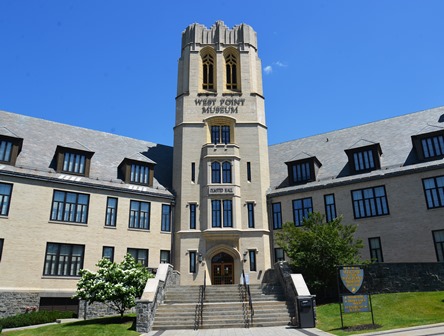
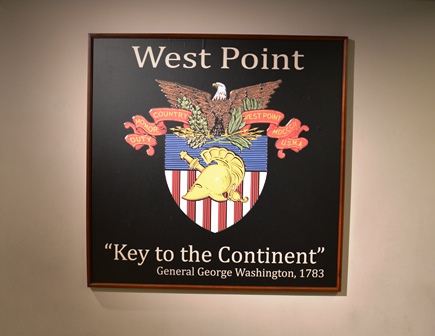
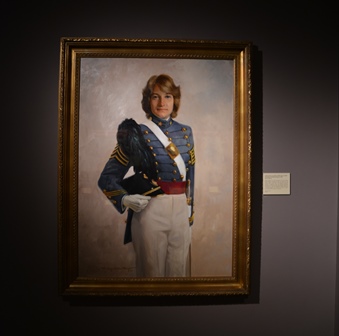
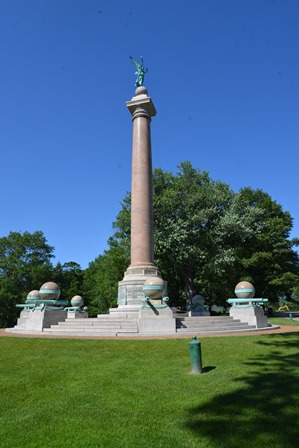
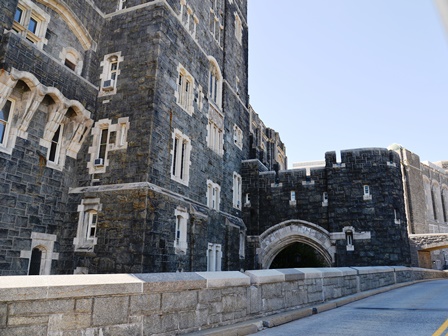
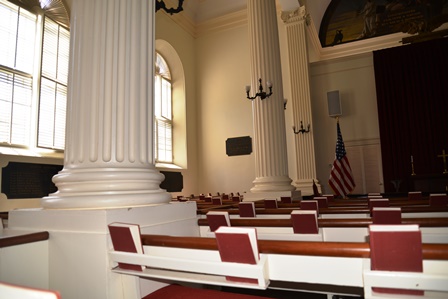
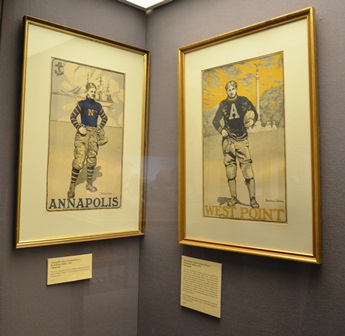
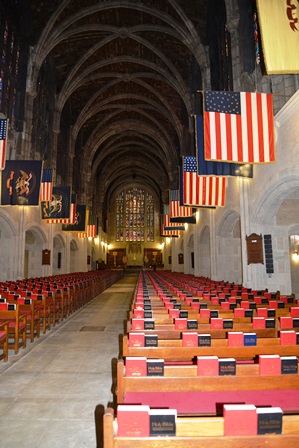
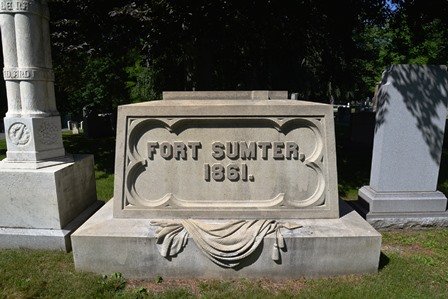
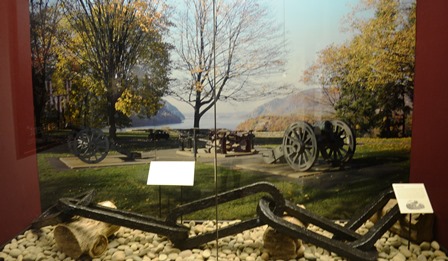
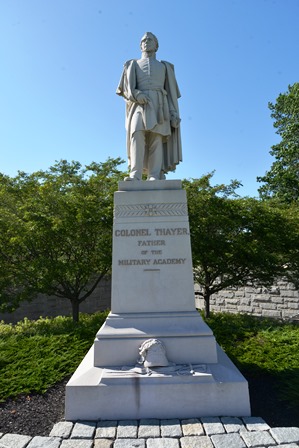
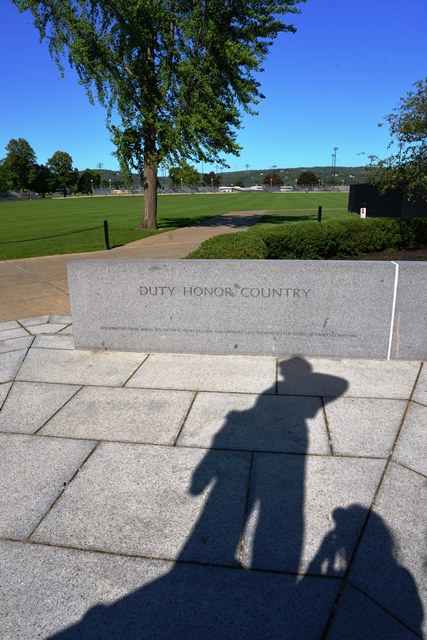
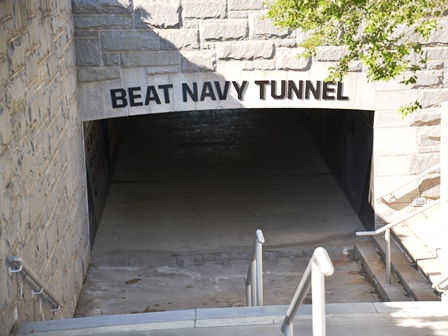






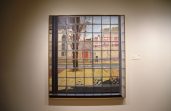
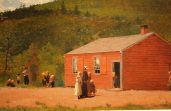


Love it.
Thanks Glenda; it was pretty amazing to be able to walk those grounds.